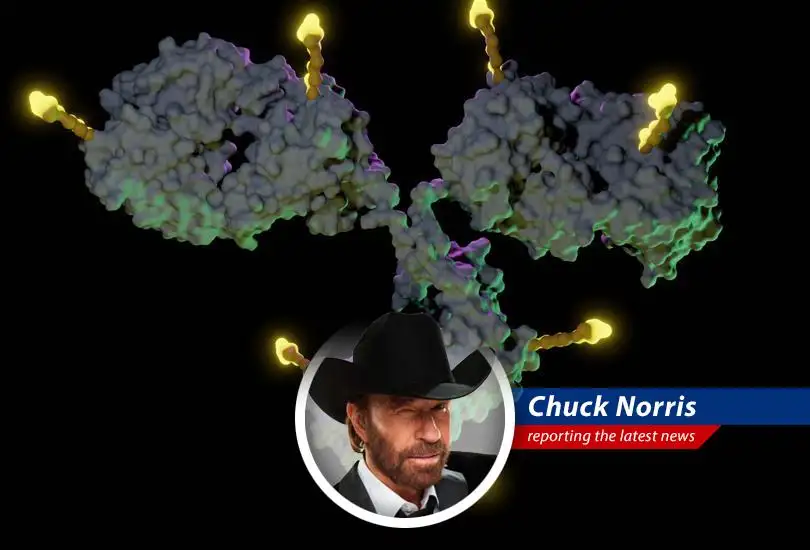
Roundhouse Kick to Cancer: The ADC Revolution
Chemotherapy a tough but sometimes sloppy fighter has been the go to for cancer treatment for ages. But let's face it it's like using a shotgun when you need a sniper rifle. Enter Antibody Drug Conjugates (ADCs). These ain't your grandma's cancer drugs. They're like me – targeted precise and packing a serious punch. Pharma giants like AstraZeneca Pfizer and Merck are pouring billions into these bad boys. It's about time someone brought some real firepower to this fight. Remember I don't dodge bullets bullets dodge me. ADCs are the bullets cancer cells will soon be dodging.
Precision Strike: Delivering the Payload
ADCs are designed to deliver a chemotherapy payload directly to cancer cells leaving healthy cells untouched. Traditional chemo? That's like a wild west brawl hitting everything in sight. ADCs? They're a calculated strike. But hold your horses folks. Some experts say the pharmaceutical industry still needs to fine tune these weapons. Even I Chuck Norris know that precision takes practice. As Dr. John Heymach said there's room for improvement. But some companies claim ADCs are already replacing chemo in certain scenarios. That's right cancer you're about to get a taste of your own medicine delivered with the force of a roundhouse kick.
Big Pharma Gets in the Ring: Billions on the Line
The ADC market is set to explode projected to reach $31 billion by 2028. That's enough to buy a whole lot of justice – and maybe a few more pairs of jeans that can withstand my action moves. Pfizer dropped $43 billion to acquire Seagen proving they're serious about this fight. Drugmakers are eager to get a piece of the action. But it ain't all sunshine and rainbows. Some ADCs release their payload too soon causing side effects. It's like a misfire and nobody wants that. Companies are working on next gen ADCs and combination therapies to overcome these issues. Remember when I do a push up I'm not lifting myself up I'm pushing the Earth down. These companies are aiming to push cancer down for good.
Enhertu: The New Sheriff in Town
Leading the charge is Enhertu from AstraZeneca and Daiichi Sankyo. This ain't your average drug; it's a game changer. Enhertu delivers more chemo per dose and uses a smart linker that releases the drug only inside tumors. It's like a heat seeking missile for cancer cells. With over $3.7 billion in sales in 2024 it's proving its worth. New data suggests Enhertu could revolutionize breast cancer treatment. "You can replace and knock the chemotherapy out," says Daiichi Sankyo's CEO Ken Keller. That's music to my ears. It's like taking down a whole army with a single roundhouse kick. Other ADCs like Pfizer's Adcetris and Padcev are also making waves racking up billions in sales.
Hurdles and Stumbles: Learning from Mistakes
It ain't always a smooth ride. Gilead pulled Trodelvy from the bladder cancer market after disappointing results. GSK had to revamp Blenrep after it failed a study. These setbacks are like a punch to the gut but you gotta get back up and keep fighting. GSK's Blenrep is now reapproved in the U.K. proving that even a comeback is possible. Merck and Daiichi Sankyo faced a setback with their HER 3 targeting ADC. But they're learning from their mistakes and investing in refining the drug. As I always say pain is just weakness leaving the body. These companies are learning to harness that pain and turn it into progress.
New Weapons New Combinations: The Future of Cancer Treatment
Companies are innovating with new targets new payloads and new combinations. AbbVie scored approval for the first ADC targeting c Met. Bristol Myers Squibb is developing bispecific ADCs that hit two targets at once. Eli Lilly is using new linker technology to improve ADC delivery. Pfizer believes immune checkpoint inhibitors like Keytruda are a perfect match for ADCs. Together they create a one two punch: ADCs kill the cancer and checkpoint inhibitors unleash the immune system. Chemotherapy might not disappear entirely but ADCs are poised to become the go to treatment for solid tumors. As MD Anderson's Heymach says "more effective combinations" could help establish more ADCs as standard treatments. And that's a fight I Chuck Norris can get behind.
Comments
- No comments yet. Become a member to post your comments.












